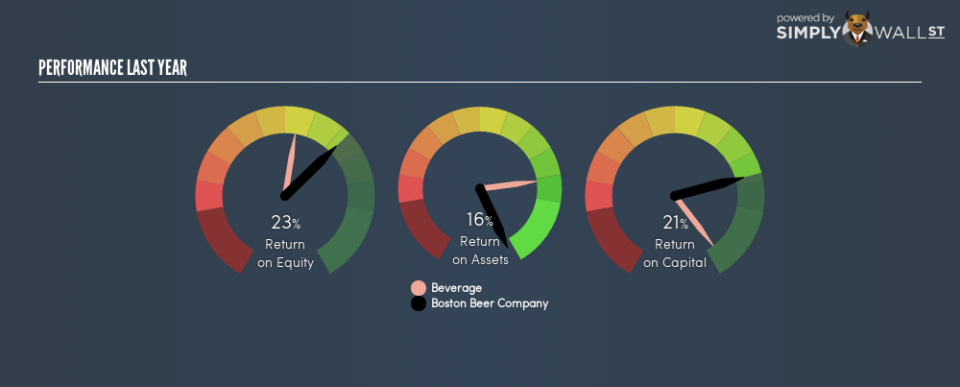Boasting A 23% Return On Equity, Is The Boston Beer Company Inc (NYSE:SAM) A Top Quality Stock?

Many investors are still learning about the various metrics that can be useful when analysing a stock. This article is for those who would like to learn about Return On Equity (ROE). To keep the lesson grounded in practicality, we’ll use ROE to better understand The Boston Beer Company Inc (NYSE:SAM).
Boston Beer Company has a ROE of 23%, based on the last twelve months. That means that for every $1 worth of shareholders’ equity, it generated $0.23 in profit.
Check out our latest analysis for Boston Beer Company
How Do I Calculate Return On Equity?
The formula for return on equity is:
Return on Equity = Net Profit ÷ Shareholders’ Equity
Or for Boston Beer Company:
23% = 100.585 ÷ US$435m (Based on the trailing twelve months to September 2018.)
Most readers would understand what net profit is, but it’s worth explaining the concept of shareholders’ equity. It is all the money paid into the company from shareholders, plus any earnings retained. The easiest way to calculate shareholders’ equity is to subtract the company’s total liabilities from the total assets.
What Does ROE Signify?
Return on Equity measures a company’s profitability against the profit it has kept for the business (plus any capital injections). The ‘return’ is the profit over the last twelve months. A higher profit will lead to a higher ROE. So, all else being equal, a high ROE is better than a low one. That means ROE can be used to compare two businesses.
Does Boston Beer Company Have A Good Return On Equity?
One simple way to determine if a company has a good return on equity is to compare it to the average for its industry. The limitation of this approach is that some companies are quite different from others, even within the same industry classification. Pleasingly, Boston Beer Company has a superior ROE than the average (17%) company in the beverage industry.
That is a good sign. I usually take a closer look when a company has a better ROE than industry peers. One data point to check is if insiders have bought shares recently.
Why You Should Consider Debt When Looking At ROE
Companies usually need to invest money to grow their profits. The cash for investment can come from prior year profits (retained earnings), issuing new shares, or borrowing. In the first and second cases, the ROE will reflect this use of cash for investment in the business. In the latter case, the debt used for growth will improve returns, but won’t affect the total equity. Thus the use of debt can improve ROE, albeit along with extra risk in the case of stormy weather, metaphorically speaking.
Combining Boston Beer Company’s Debt And Its 23% Return On Equity
One positive for shareholders is that Boston Beer Company does not have any net debt! Its high ROE already points to a high quality business, but the lack of debt is a cherry on top. After all, when a company has a strong balance sheet, it can often find ways to invest in growth, even if it takes some time.
But It’s Just One Metric
Return on equity is one way we can compare the business quality of different companies. Companies that can achieve high returns on equity without too much debt are generally of good quality. All else being equal, a higher ROE is better.
But ROE is just one piece of a bigger puzzle, since high quality businesses often trade on high multiples of earnings. It is important to consider other factors, such as future profit growth — and how much investment is required going forward. So I think it may be worth checking this free report on analyst forecasts for the company.
But note: Boston Beer Company may not be the best stock to buy. So take a peek at this free list of interesting companies with high ROE and low debt.
To help readers see past the short term volatility of the financial market, we aim to bring you a long-term focused research analysis purely driven by fundamental data. Note that our analysis does not factor in the latest price-sensitive company announcements.
The author is an independent contributor and at the time of publication had no position in the stocks mentioned. For errors that warrant correction please contact the editor at editorial-team@simplywallst.com.

